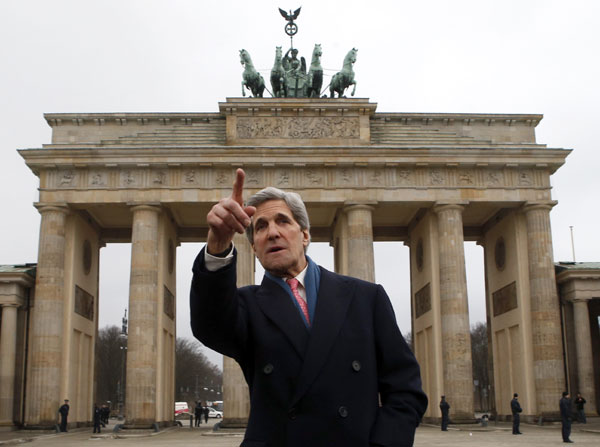Kerry makes case for free trade pact
Updated: 2013-02-27 09:13
(Agencies/China Daily)
|
||||||||
 |
|
US Secretary of State John Kerry gestures as he stands in front of the Brandenburg Gate in Berlin on Tuesday. Kerry arrived in Berlin on Monday, a stop on a nine-nation, 11-day trip that will take him to Paris, Rome, Ankara, Cairo, Riyadh, Abu Dhabi and Doha. [Photo/Agencies] |
US Secretary of State John Kerry pushed on Tuesday for a free-trade agreement between the United States and Europe, saying it is a priority for US President Barack Obama's second term that would help create jobs and growth on both sides of the Atlantic.
The proposal has been garnering support on both continents, with Obama saying earlier this month that the US believes "trade that is free and fair across the Atlantic supports millions of good-paying American jobs".
Speaking after talks on Tuesday with German Chancellor Angela Merkel and Foreign Minister Guido Westerwelle, Kerry said such an agreement would be a boon to the US and Europe.
Berlin was the second stop on Kerry's 11-day, nine-country trip to Europe and the Middle East. It is his first trip abroad since taking over at the State Department on Feb 1. Observers said his purpose was to seek close cooperation with old allies.
Kerry began his visit in London, where he met British Prime Minister David Cameron and his British counterpart William Hague.
Policymakers in Britain and Germany responded positively to Kerry's choice of Europe as his first foreign destination. By contrast, his predecessor, Hillary Clinton, selected East Asia when she took office in 2009.
Calling it "an important transatlantic signal", Westerwelle said Kerry's visit "proves everyone wrong who thought that Europe does not matter anymore for the US", when interviewed by German media.
With the Syrian crisis at top of his agenda, Kerry is also scheduled to meet Russian Foreign Minister Sergey Lavrov during his stay in Berlin, which observers said will also set the tone for US-Russia relations during Obama's second term.
Jin Canrong, a global affairs professor at Renmin University of China, said Kerry's first foreign trip demonstrates Washington's efforts to balance its strategic interests in Europe and the Asia-Pacific as the US pivot to Asia is unlikely to waver.
"The 'Return to Asia' strategy during Obama's first term brought complaints from many US allies in Europe and the Middle East, as Washington shifted its focus from the Atlantic to the Pacific," Jin said.
"So the first thing for Obama to do is to take care of their hurt feelings."
Guo Xiangang, a researcher on US studies at the China Institute of International Studies, said the White House is trying to adjust its foreign policy in light of its unsatisfactory rebalancing in Asia, which fell short of achieving what it expected and left the Middle East in chaos.
"Developing political turmoil in Syria and North Africa calls for more US involvement, but looking from a global perspective, US strength is limited in terms of its allocation of strategic resources," Guo said.
"One important goal of Kerry's busy schedule is to encourage European governments, its long-term allies, to take more initiatives in solving issues in the Middle East," Guo added.
After Berlin, Kerry will fly to Paris to discuss the military intervention in Mali spearheaded by France, and later, will travel to Rome to talk with the Syrian opposition and their Western backers, seeking to support them in their nearly two-year quest to oust President Bashar al-Assad.
The United Nations estimates almost 70,000 people have been killed in the 22-month conflict in Syria.
AP-Xinhua-China Daily

 Li Na on Time cover, makes influential 100 list
Li Na on Time cover, makes influential 100 list
 FBI releases photos of 2 Boston bombings suspects
FBI releases photos of 2 Boston bombings suspects
 World's wackiest hairstyles
World's wackiest hairstyles
 Sandstorms strike Northwest China
Sandstorms strike Northwest China
 Never-seen photos of Madonna on display
Never-seen photos of Madonna on display
 H7N9 outbreak linked to waterfowl migration
H7N9 outbreak linked to waterfowl migration
 Dozens feared dead in Texas plant blast
Dozens feared dead in Texas plant blast
 Venezuelan court rules out manual votes counting
Venezuelan court rules out manual votes counting
Most Viewed
Editor's Picks

|

|

|

|

|

|
Today's Top News
Live report: 7.0-magnitude quake hits Sichuan, heavy casualties feared
Boston suspect cornered on boat
Cross-talk artist helps to spread the word
'Green' awareness levels drop in Beijing
Palace Museum spruces up
First couple on Time's list of most influential
H7N9 flu transmission studied
Trading channels 'need to broaden'
US Weekly

|

|







